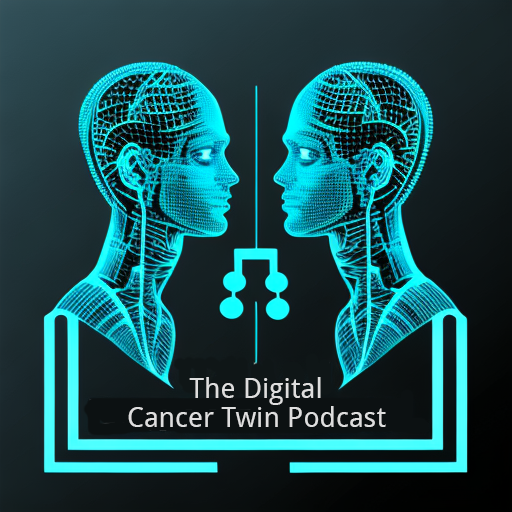Welcome to the archival site for the Digital Cancer Twin Project.
Funded by the New Frontiers in Research Fund
The Digital Cancer Twin Project is an interdisciplinary grant-funded project looking to expand interdisciplinary thinking in the fields of artificial intelligence, health medicine, and ethics. The result is a host of new collaborations across disciplines with different perspectives on core issues in health and AI and a unique digital humanities archival project in media res. Rarely do highly technical computing projects like the digital cancer twin have their development tracked, categorized, and analyzed (metaphysically, aesthetically, and ethically) in the midst of their development. AIs are typically developed in isolation from the broader social context in which these systems will be deployed, missing the human context needed to create the least biased and highest quality systems possible. And, more often than not, these projects have their consequences analyzed well after the fact. In bringing together the fields of computer science, health science, philosophy, and cultural sociology, we are able to theorize and communicate existential and social dimensions of AI in the hopes of preventing potential ethical problems before the AI actively becomes a larger part of the medical system.

The Digital Cancer Twin Project Podcast
The Digital Cancer Twin Podcast comes out of an interdisciplinary collaboration between Queen’s School of Computing and School of Religion to investigate the ethical, social, philosophical and technical implications of the cutting-edge AI cancer diagnostic technology that is being developed at Queen’s. This technology allows patients to receive accurate cancer diagnoses and predictions in the early stages of their treatment. What happens when one’s future life can be predicted using algorithmic models? What new responsibilities do medical practitioners need to be aware of while using this new tool? Subscribe, listen and learn more at https://www.queensu.ca/health-innovation/digital-cancer-twin-project/
Episodes:
1 – Introduction to the Digital Cancer Twin Project
2 – Artificial Intelligence, Military Funding, and the Digital Cancer Twin, with Dr. Amber Simpson
3 – Race Medicine, Data Justice, and an Ethics of Artificial Intelligence, with LLana James
4 – Race Medicine, Data Justice, and an Ethics of Artificial Intelligence, with Dr. Sharday Mosurinjohn
This Podcast was Edited and Produced by Dr. Jordan Loewen-Colón and Andrei Pora
Published Articles:
- J Loewen-Colón, Sharday C Mosurinjohn. “Fabulation, Machine Agents, and Spiritually Authorizing Encounters.” For a special issue of Religions, 2022.
- P. Causa Andrieu, J. S. Golia Pernicka, K. Lupton, K. Batch, F, Zulkernine, A. L. Simpson, M. Taya, L. Gazit, M. H. Nguyen, K. Nicholas, N. Gangai, V. Sevilimedu, S. Dickinson, V. Paroder, D. B. Bates, R. Yaeger, R. K. G. Do. “Natural language processing of CT reports to label metastatic phenotypes with prognostic significance in patients with colorectal cancer, JCO Clinical Cancer Informatics,” 2022
- K. Batch, J. Yue, A. Darcovich, K. Lupton, C. C. Liu, D. P. Woodlock, M. A. K. El Amine, P. I. Causa Andrieu, L. Gazit, G. H. Nguyen, F. Zulkernine, R. K. Do, A. L. Simpson. “Developing a Cancer Digital Twin: Supervised Metastases Detection from Consecutive Structured Radiology Reports.” Frontiers in AI, 2022
- S. Sun, K. Lupton, K. Batch, H. Nguyen, L. Gazit, N. Gangai, J. Cho, K. Nicholas, F. Zulkernine, A. L. Simpson, R. K. G. Do. “Natural language processing of large-scale structured radiology reports to identify cancer patients with or without splenomegaly over a ten-year period.” JCO Informatics: 6, 2022
- R. K. Do, K. Lupton, P. Causa, A. Luthra, M. Taya, K. Batch, H. Nguyen, P. Rahurkar, L. Gazit, K. Nicholas, C. J. Fong, N. Gangai, N. Shultz, F. Zulkernine, V. Sevilimedu, K. Juluru, A. L. Simpson, H. Hricak. “Patterns of metastatic disease in cancer patients derived from natural language processing of structured CT radiology reports over a ten-year period.” Radiology, 301(1):115-122, 2022
- C. Stinson, L. James, M. Abdalla, N. Möllers, S. Mosurinjohn, S. Phillips, A. L. Simpson. “NDRIO: Limit Corporate Influence, Maximize Public Involvement and Accountability, National Digital Research Infrastructure Organization (NDRIO).” White Paper, 2021.
Abstracts:
P. Causa Andrieu, K. Lupton, V. Savilimedu, N. Huy, M. Maya, K. Batch, F. Zulkernine, L. Gazit, N. Gangain, A.L. Simpson, J. Golia Pernicka, R. K. Do. “Overall survival of colorectal cancer patients stratified by metastatic disease patterns identified on CT report using natural language processing,” ESGAR, 2021.
S. Sun, K. Lupton, K. Batch, N. Gangai, J. Cho, L. Gazit, H. Nguyen, F. Zulkernine, A.L. Simpson, R. K. Do. “Prediction of splenomegaly >100,000 structured oncologic radiology reports using natural language processing,” ESGAR, 2020.
P. Causa Andrieu, K. Lupton, K. Batch, N. Gangai, L. Gazit, H. Nguyen, F. Zulkernine, A. L. Simpson, R. K. Do. “Natural language processing for labeling of metastatic disease from gastrointestinal tract and pancreatic cancer in structured radiology reports: preliminary results.” Society of Abdominal Radiology 2020 Annual Scientific Meeting and Educational Course, March 1 – 6, 2020.
